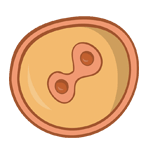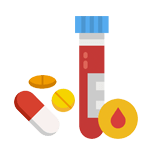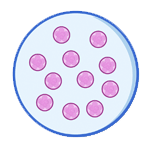Egg Freezing
For most women, fertility declines slowly with time and becomes significantly lower by their late 30s and early 40s. Egg freezing is a method of fertility preservation, which allows women to freeze eggs for later use.
As women get older the quantity and quality of their eggs will deteriorate and make it harder to conceive. By freezing your eggs you are essentially preserving the age of your eggs and improving your chances of having a baby later in life.
Candidates for Egg Freezing
There are many reasons why women choose to freeze their eggs
-
Elective/Social Freezing:
-
1. You do not want a baby now but are worried about your age and want to preserve fertility for the future.2. You may not have found the right partner yet.3. You might want more time to pursue your career before having children.
-
-
Women with certain medical conditions that need to preserve their fertility before their treatment. (e.g. young cancer patients).
-
Women who are likely to go for early menopause due to their genetic conditions such as Turner Mosaic, Fragile X syndrome which leads to Premature Ovarian Failure (POF) / Premature Ovarian Insufficiency (POI).
-
Due to unavailability, the husband is unable to give a semen sample on the day of oocyte retrieval for IVF treatment.
-
The couple wants to take benefits of Frozen Embryo Transfer (FET) but is unable to do so, due to the husband suffering from some viral infection such as Hepatitis.
-
Due to religious or personal reasons, some women prefer egg freezing instead of embryo freezing when undergoing IVF.
Egg Freezing Process
Egg vitrification is the method used in IHR for the fast freezing of your eggs.

Hormone stimulation taken to mature appropiate number of eggs in ovaries

5-6 clinic visits for blood tests and medication.

Once egg sacs (follicies) reach appropriate size, eggs collected in theatre.

Eggs frozen using Vertification fast-freezing technology, which ensures cells retain structural integrity.
View consent form
Frequently asked questions (FAQ)
-
What makes one fertility clinic lab better than another for egg cryopreservation?
-
There are many clinics that offer egg freezing, but many of the newer clinics have only frozen eggs (they haven’t thawed eggs or had success creating babies with the eggs they’ve frozen). We recommend finding a clinic that not only freezes eggs but also performs IVF in-house. Make sure to ask for a clinic’s thaw rates and live birth success rates to get an idea of your chances of having a baby in the future.
The hardest procedures in fertility medicine are egg freezing and embryo biopsy. With egg freezing there is one cell; so you get one chance to do this right. You want to go to a clinic like IHR that does this time and time again. You can have good eggs, but if they are frozen in not the best way they won’t work later on!
-
Is the egg freezing procedure painful?
-
No, it is not painful. Other than taking routine S/C or I.M injections for 10-15 days using very thin needles. During the egg retrieval, you’ll be under twilight anesthesia and won’t feel a thing. You may experience little soreness in the vaginal area and/or some abdominal cramping, similar to how you might feel when you’re getting your period.
-
Do I have to take leave during the stimulation period?
-
No, you don’t have to take leave from your work during this period. You have to visit our clinic every day for about 1 hr to take injections and ultrasounds. This can be adjusted with prior appointments.
-
How many days does it take to recover from the egg retrieval?
-
We recommend you take the day off from work on the day of your retrieval, so you can rest for the remainder of the day after the procedure. The vaginal soreness and cramping can last for a few days. But usually, that’s it.
-
When will my period return after egg retrieval?
-
A woman with a regular period can expect to get her next period at the same time she would have during a normal cycle, 28–30 days after her previous period began.
-
How many eggs should I aim to freeze?
-
That depends on several factors, the most important one being age. That’s because your age at the time of freezing is the best way to predict how many of your eggs will be genetically normal. While there isn’t a specific “magic number” that will guarantee a pregnancy later on, women 34 or younger can feel confident that freezing 10 eggs will give them a high potential for creating at least one child if used later on. For women 35–38 years old, about 15 eggs are optimal; for women 38 and older, the data are more limited and less clear; a cautious approach would be to aim for freezing 20 eggs or more.
-
Am I likely to need more than one egg freezing cycle to preserve enough eggs?
-
It depends. Many younger women will reach their egg freezing target in just one attempt, while older women are likely to need to complete multiple egg freezing cycles to reach their goal.
-
Can I do multiple egg freezing cycles back to back?
-
It depends. You can start a new cycle right after completing a prior cycle, so long as your baseline testing is normal. Some women may need a month or multiple months “off” between cycles to reach a normal baseline.
-
How long can you freeze your eggs?
-
IHR has had patients freeze their eggs and return to us 10 years later to have a baby. Basically, there is no expiration date on your eggs!
-
Can you tell a good egg from a bad egg?
-
Unfortunately, we cannot. The only information we can tell you about your eggs is if they are mature or immature. A mature egg does not mean it is good quality, but it means that it is at the stage that it can be fertilized (only mature eggs can be fertilized). While there are certain parameters that point to good egg quality (young age) we cannot tell anything about the health of an egg until it is fertilized by a sperm.
-
Do I need to prepare my body and change my diet before I start the egg freezing process?
-
While it’s always good to live a healthy life, your eggs have been there with you for your entire life. Making alterations in your lifestyle will likely not change your egg quality. The exception here is smoking—smoking is not good for your eggs! The sooner you quit the better. And being obese (BMI: >25) definitely decreases the chances of pregnancy after transfer.
-
How will I use my frozen eggs when I am ready to get pregnant?
-
If you want to use your frozen eggs, they’ll be thawed and fertilized with partner sperm using in vitro fertilization (IVF) and will be transferred into your uterus.
-
What is the success rate for frozen eggs?
-
The survival rates of eggs after freezing have increased(over 80%), particularly following the development of Vitrification technology. The egg vitrification survival rate can be very high, over 80% of frozen eggs can now survive thawing.
Your age at the time you freeze your eggs and how many eggs you freeze are the two most important factors affecting your chance of having a baby with frozen eggs.
-
If you’re under 35 and you freeze 10 eggs, your chances of at least one live birth using those eggs later are about 60–70%. If you freeze 20 eggs, you have about a 90% chance of those eggs resulting in at least one live birth later on.
-
If you’re 37, your chances for at least one live birth later are about 50% with 10 frozen eggs and 75% with 20 frozen eggs.
-
If you’re 40, your chances for at least one live birth later are about 30% with 10 frozen eggs and 50% with 20 frozen eggs.
-
-
I have a low AMH level. Can I still freeze my eggs?
-
Yes. Women with low AMH levels are still candidates for egg freezing, but they may need multiple egg freezing cycles to reach their goal.
-
What happens to my eggs if I don’t use them?
-
Some women who freeze their eggs go on to find a partner and get pregnant the old-fashioned way. (For them, their banked eggs may give them a chance at having a second or third child, if they choose!) And some women decide not to use their eggs at all. In that case, they may be able to donate them to a specific person for reproductive purposes or have their eggs appropriately discarded. You also have an option to donate your eggs anonymously.

.png) 0361-2800800
0361-2800800 (+91) 9435502020
(+91) 9435502020







